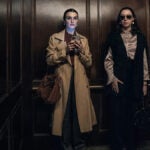
This story about Bel Powley and “A Small Light” first appeared in the Limited Series / TV Movies issue of TheWrap’s awards magazine.
Like so many of us, Bel Powley read “The Diary of a Young Girl” by Anne Frank when she was in school. But she was less familiar with the woman responsible for the world’s awareness of the diary: Miep Gies. The secretary of Otto Frank, Gies helped hide the Frank family from the Nazis for two years in Amsterdam and kept Anne’s diary safe after the family was arrested in 1945.
“I know a lot about this part of history — the big historical and political backdrop — but I didn’t know anything about Miep or the Dutch resistance,” Powley said. So playing Gies in the National Geographic limited series “A Small Light” was a daunting experience — but also a deeply rewarding one. “It’s so rare in one’s career where everything falls into place,” said the actress, who broke out in 2015 with the acclaimed indie “The Diary of a Teenage Girl.” “This was a job where every box was ticked. So I’m trying to soak up this moment. It might be another 20 years before I enjoy my job this much again.”
What made you want to do “A Small Light”?
BEL POWLEY Oh, God, so many things. I’m Jewish, so I feel personally connected to this part of history. But in the past in my career, I have shied away from period pieces because I often find myself feeling quite disconnected from them. But when I read the pilot for this, I was so blown away by how contemporary it felt, how contemporary Miep felt. She was a very modern woman for the time. But also, it was the tone that the showrunners [Tony Phelan and Joan Rater] were going for, where we talk in modern language. It just has this looser, more naturalistic, less trussed-up feel to it.
There’s been a lot of stuff out there about the Holocaust, Anne and World War II. And in my opinion, a lot of that is told from the point of view of men — men at war, men in the trenches. Or it will be harrowing stories about the camps. Those are incredibly important stories to tell, but they’re the stories that we know so well. What I found so enticing about this take on this part of history was that it has lightness. It just felt very human, not just like it had been lifted from a textbook.
That struck me as well, that however heroic Miep was — and that is undeniable — she was an everywoman and is presented here without a saintly filter. And Anne Frank is a fickle teenager with crushes who squabbles with her sister and mother.
Exactly. You know, people were still having to navigate their marriages through this time, people were still having to parent their kids. Anne was going through probably the most intense time that anyone goes through. The age of 13 to 15 is literally when you’re turning from a girl into a woman. It’s also a coming-of-age story for Miep, who is a young woman in her 20s. We were trying to make people think about this part of history and the parallels to now by focusing on really relatable attributes.

This is the first TV project in which you’re the star. You are the face of the show — on ads and posters. How did that feel?
Scary. And exciting. I felt large amounts of responsibility going into this show because yes, I was the lead. But also, it was a big responsibility because [I’m playing] a real person, and it was about a very intense part of history that means a lot to so many people. So, yeah, I felt pressure. I think maybe the fact that Miep was an everyday woman made it a bit easier for me to step into the shoes of this real person because she is so relatable. And that, by the way, is how she wanted it. She went around the world after the war and would end her talks with her mantra, which is where the title of the show is from: No one should ever think they have to be special in order to help others. Anyone, even an ordinary housewife or a teenager or a secretary, can turn on a small light in a dark room.















